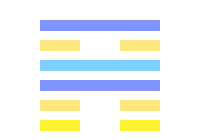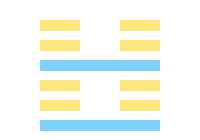56.1.3.6 (56 > 51)

56.1.3.6 (56 > 51) - THE LÜ HEXAGRAM.
- 1. The first line, divided, shows the stranger mean and meanly occupied. It is thus that he brings on himself (further) calamity.
- 3. The third line, undivided, shows the stranger, burning his lodging-house, and having lost his servants. However firm and correct he (try to) be, he will be in peril.
- 6. The sixth line, undivided, suggests the idea of a bird burning its nest. The stranger, (thus represented), first laughs and then cries out. He has lost his ox(-like docility) too readily and easily. There will be evil.
56.1.3.6 (56 > 51) - Lu, le voyageur
Lu : voyageur, hôte, étranger, loger ; bon arrangement.
- 1. Les étrangers ambulants, petits et faibles, sont exposés à bien des maux. [Quand le but est bas, les calamités s’ensuivent.]
-
3. Il arrive que cet étranger brûle sa maison, perde ses bons et intelligents serviteurs, sa prospérité est bien en péril. [Il brûle sa maison en se ruinant ; en fréquentant les gens vulgaires, il perd son habileté, sa rectitude.]
- 6. L’oiseau détruit son nid ; l’étranger ambulant rit d’abord, puis pousse de hauts cris, parce qu’il perd son bœuf ; ainsi, trop aisément, un changement amène un mal.
56.1.3.6 (56 > 51) - Chercher
On frime pour ne pas avoir l'air d'être timide.
Bing DeepL Google Yandex56.1.3.6 (56 > 51) - Keresés
- 1. Ha valaki nagy veszteségeket szenvedett, nem engedheti el magát.
- 3. Ha elfeledkezik a közeliekről elveszíti őket.
- 6. Meggondolatlanság elfogadni megbeszélés nélkül.
Les trigrammes
Les trigrammes sont des combinaisons de trois traits yin et yang. Dans l'hexagramme, les trois traits du dessous constituent le trigramme inférieur et représentent la situation intérieure. Les trois lignes du haut constituent le trigramme supérieur et représentent la situation extérieure.
Trigramme supérieur : Le feu Le tonnerre


Trigramme inférieur : La montagne Le tonnerre


La formation: 56
What is already there

56 - THE LÜ HEXAGRAM.
Lü intimates that (in the condition which it denotes) there may be some little attainment and progress. If the stranger or traveller be firm and correct as he ought to be, there will be good fortune.
Bing DeepL Google Yandex56 - Lu, le voyageur
Lu : voyageur, hôte, étranger, loger ; bon arrangement.
Lu « bon arrangement ». Avec un faible commencement, le bon arrangement conduit au succès, à la consolidation, au bonheur.
Texte
L’étranger ambulant prospère difficilement. S’il est juste et droit, il aura une heureuse fortune.
Symbolisme
Le feu au-dessus d’une montagne. Ainsi le grand et sage fait briller sa droiture en appliquant les lois pénales et ne laisse pas durer les différends et les procès.
Commentaire
Si le faible acquiert, maintient sa droiture chez les étrangers et reste soumis au fort, il sera stable et attaché à la claire vérité. Ainsi l’étranger nomade, faible au commencement, prospérera et s’affermira s’il est droit et juste.

56.1 (56 > 30) - THE LÜ HEXAGRAM.
The first line, divided, shows the stranger mean and meanly occupied. It is thus that he brings on himself (further) calamity.
Bing DeepL Google Yandex56.1 (56 > 30) - Coping
When one has suffered great losses, one must not let oneself go.
Bing DeepL Google Yandex56.1 (56 > 30) - Coping
When one has suffered great losses, one must not let oneself go.
Bing DeepL Google Yandex56.1 (56 > 30) - Lu, le voyageur
Lu : voyageur, hôte, étranger, loger ; bon arrangement.
Les étrangers ambulants, petits et faibles, sont exposés à bien des maux. [Quand le but est bas, les calamités s’ensuivent.]
Bing DeepL Google Yandex56.1 (56 > 30) - Tenir le coup
Quand on a beaucoup perdu, on ne doit pas se laisser aller.
Bing DeepL Google Yandex56.1 (56 > 30) - Keresés
Ha valaki nagy veszteségeket szenvedett, nem engedheti el magát.
Bing DeepL Google Yandex
56.3 (56 > 35) - THE LÜ HEXAGRAM.
The third line, undivided, shows the stranger, burning his lodging-house, and having lost his servants. However firm and correct he (try to) be, he will be in peril.
Bing DeepL Google Yandex56.3 (56 > 35) - Lu, le voyageur
Lu : voyageur, hôte, étranger, loger ; bon arrangement.
Il arrive que cet étranger brûle sa maison, perde ses bons et intelligents serviteurs, sa prospérité est bien en péril. [Il brûle sa maison en se ruinant ; en fréquentant les gens vulgaires, il perd son habileté, sa rectitude.]
56.3 (56 > 35) - Remettre sa démission
On oublie un proche alors on le perd.
Bing DeepL Google Yandex
56.6 (56 > 62) - THE LÜ HEXAGRAM.
The sixth line, undivided, suggests the idea of a bird burning its nest. The stranger, (thus represented), first laughs and then cries out. He has lost his ox(-like docility) too readily and easily. There will be evil.
Bing DeepL Google Yandex56.6 (56 > 62) - Being light-headed
It is imprudent to accept without discussion.
Bing DeepL Google Yandex56.6 (56 > 62) - Being light-headed
It is imprudent to accept without discussion.
Bing DeepL Google Yandex56.6 (56 > 62) - Lu, le voyageur
Lu : voyageur, hôte, étranger, loger ; bon arrangement.
L’oiseau détruit son nid ; l’étranger ambulant rit d’abord, puis pousse de hauts cris, parce qu’il perd son bœuf ; ainsi, trop aisément, un changement amène un mal.
Bing DeepL Google YandexEn préparation : 51
Ce qui est en passe d'arriver

51 - THE KĂN HEXAGRAM.
Kăn gives the intimation of ease and development. When (the time of) movement (which it indicates) comes, (the subject of the hexagram) will be found looking out with apprehension, and yet smiling and talking cheerfully. When the movement (like a crash of thunder) terrifies all within a hundred lî, he will be (like the sincere worshipper) who is not (startled into) letting go his ladle and (cup of) sacrificial spirits.
Bing DeepL Google Yandex51 - Shock
Something is coming which enables the identification of a problem.
Bing DeepL Google Yandex51 - Shock
Something is coming which enables the identification of a problem.
Bing DeepL Google Yandex51 - Kán, l’ébranlement
Kán : tonnerre, effroi répandu, crainte.
Kán« tonnerre, effroi se répandant, appréhension ». Le tonnerre survenant répand l’effroi ; par l’effroi, les rires et les causeries s’arrêtent court. Le tonnerre terrifie cent lis, mais ne doit pas arrêter la cuiller du sacrifice aux esprits (le sacrifice) 1.
1 Le tonnerre peut arrêter tout mais pas empêcher le sacrifice.
Texte
Le tonnerre approchant répand l’effroi ; les rires, les causeries s’arrêtent subitement. Le tonnerre terrifie cent lis, mais ne doit pas arrêter la cuiller du sacrifice aux esprits.
Commentaire
Cet effroi a d’heureux résultats. Les rires et les causeries gardent ainsi la mesure. Le tonnerre terrifie ce qui est loin comme ce qui est près. Mais on doit, quand même, garder le temple des ancêtres, les autels des génies du sol et présider aux sacrifices. (Malgré l’effroi, on ne peut les interrompre.)
Symbolisme
Le tonnerre répété forme l’hexagramme. Le sage, plein de crainte et de scrupules prudents, observe et corrige.
51 - Megrázkódtatás
Valami közelít ami lehetővé teszi a probléma felismerését.
Bing DeepL Google YandexL'hexagramme nucléaire : 28.2.4 (28 > 39)
L'hexagramme nucléaire est l'association des deux trigrammes intérieurs (traits 2,3,4 et 3,4,5). Il représente la racine, ou l'origine de la situation.

28.2.4 (28 > 39) - THE TÂ KWO HEXAGRAM.
- 2. The second line, undivided, shows a decayed willow producing shoots, or an old husband in possession of his young wife. There will be advantage in every way.
- 4. The fourth line, undivided, shows a beam curving upwards. There will be good fortune. If (the subject of it) looks for other (help but that of line one), there will be cause for regret.
28.2.4 (28 > 39) - Lacking patience
One is downgrading one's chances of success.
Bing DeepL Google Yandex28.2.4 (28 > 39) - Lacking patience
One is downgrading one's chances of success.
Bing DeepL Google Yandex28.2.4 (28 > 39) - Tá kvoh, le grand excès
Tá kvoh : 1. Grand excès, défaut, manquement ; 2. Traverser, dépasser.
- 2.
- 4. Une colonne haute et forte est bonne ; toute autre est dangereuse (opposition à ce qui précède)
28.2.4 (28 > 39) - Manquer de patience
On revoit à la baisse ses chances de succès.
Bing DeepL Google Yandex28.2.4 (28 > 39) - Lemondás
- 2. Ha valaki nehézségekbe ütközik, emelje fel a leggyengébbet is hogy megőrizhesse jövőjét.
- 4. Mások támogatják de még fel kell épülnie.
Guide
La situation de départ

56.6 (56 > 62) - THE LÜ HEXAGRAM.
The sixth line, undivided, suggests the idea of a bird burning its nest. The stranger, (thus represented), first laughs and then cries out. He has lost his ox(-like docility) too readily and easily. There will be evil.
Bing DeepL Google Yandex56.6 (56 > 62) - Being light-headed
It is imprudent to accept without discussion.
Bing DeepL Google Yandex56.6 (56 > 62) - Being light-headed
It is imprudent to accept without discussion.
Bing DeepL Google Yandex56.6 (56 > 62) - Lu, le voyageur
Lu : voyageur, hôte, étranger, loger ; bon arrangement.
L’oiseau détruit son nid ; l’étranger ambulant rit d’abord, puis pousse de hauts cris, parce qu’il perd son bœuf ; ainsi, trop aisément, un changement amène un mal.
Bing DeepL Google YandexCorrection
La direction suivant laquelle le guide va plier

56.1.3 (56 > 21) - THE LÜ HEXAGRAM.
- 1. The first line, divided, shows the stranger mean and meanly occupied. It is thus that he brings on himself (further) calamity.
- 3. The third line, undivided, shows the stranger, burning his lodging-house, and having lost his servants. However firm and correct he (try to) be, he will be in peril.
56.1.3 (56 > 21) - Searching
One brings together several teams to assess their training.
Bing DeepL Google Yandex56.1.3 (56 > 21) - Searching
One brings together several teams to assess their training.
Bing DeepL Google Yandex56.1.3 (56 > 21) - Lu, le voyageur
Lu : voyageur, hôte, étranger, loger ; bon arrangement.
- 1. Les étrangers ambulants, petits et faibles, sont exposés à bien des maux. [Quand le but est bas, les calamités s’ensuivent.]
-
3. Il arrive que cet étranger brûle sa maison, perde ses bons et intelligents serviteurs, sa prospérité est bien en péril. [Il brûle sa maison en se ruinant ; en fréquentant les gens vulgaires, il perd son habileté, sa rectitude.]
56.1.3 (56 > 21) - Chercher
On réunit plusieurs équipes pour jauger leur entraînement.
Bing DeepL Google Yandex56.1.3 (56 > 21) - Keresés
- 1. Ha valaki nagy veszteségeket szenvedett, nem engedheti el magát.
- 3. Ha elfeledkezik a közeliekről elveszíti őket.
Forum
Avez-vous besoin d'aide pour comprendre ce tirage ?
Rejoignez le forum et demandez de l'aide.
BBCode
Le BBCode ci-dessous est à votre disposition pour être copié-collé dans votre fil de discussion.
Link
Lien vers ce tirage

